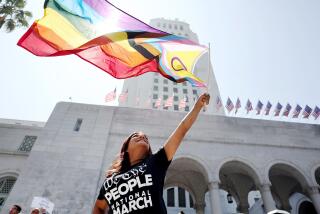Fewer Californians Lighting Up, Study Says
- Share via
ATLANTA — California is rapidly snuffing out smoking through higher cigarette taxes and anti-tobacco campaigns, the federal government said Thursday.
Only 15.5% of California adults smoked regularly in 1995, down from 26% in 1984, the Centers for Disease Control and Prevention said in a state-by-state look at smoking.
By comparison, Kentucky, one of the nation’s top tobacco-producing states, had the highest smoking rate in 1995, with 27.8% of adults saying they light up regularly. Kentucky has long been near the top.
Utah had the lowest smoking rate, 13.2%. It has been near the bottom in recent years.
California was among the first states to ask voters whether they wanted higher taxes on cigarettes. Voters in 1989 raised the tax from 10 cents to 35 cents a pack. Massachusetts followed suit in 1993, going from 26 cents to 51 cents a pack. Kentucky’s tax on cigarettes is 3 cents a pack.
In California, the extra revenue goes toward state anti-smoking campaigns, including TV and radio public service announcements, telephone hot lines and programs in schools.
“This strategy is one of the most effective ways of decreasing cigarette consumption, both by pricing out teenagers and encouraging adults to cut out smoking,” said Michael Eriksen, director of the CDC’s Office on Smoking and Health.
The CDC estimated that California adults, on average, will buy 75 packs of cigarettes each this year, down from 89 in 1992. Adults in Massachusetts will buy about 94 packs each in 1996, down from 117.
John Banzhaf, executive director of the Washington-based Action on Smoking and Health, said higher taxes are the best way to curb smoking among teenagers.
“You talk about a 13-year-old kid who’s saving up for a rock concert or a new CD and suddenly they are having to pay more for cigarettes,” Banzhaf said. “This provides us with a way of getting to a group which previously has been difficult to get to.”
The CDC’s goal is to reduce the percentage of adult smokers nationwide to 15% by 2000. The agency said if the nation’s youths can’t kick the habit, smoking will end up killing more than 5 million of them and will run up $200 billion in health care costs.
Tobacco companies warn that there are costly results from a tax increase.
“The more you make the tax disparity larger, the more you encourage people to become involved in cigarette smuggling,” said Walker Merryman of the Tobacco Institute, an organization representing tobacco companies nationwide. “That creates a law enforcement expense.”
More to Read
Sign up for Essential California
The most important California stories and recommendations in your inbox every morning.
You may occasionally receive promotional content from the Los Angeles Times.













